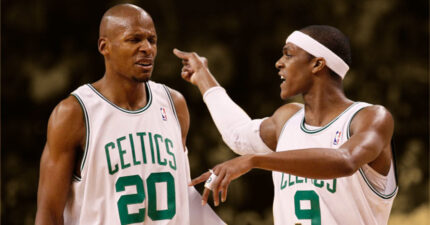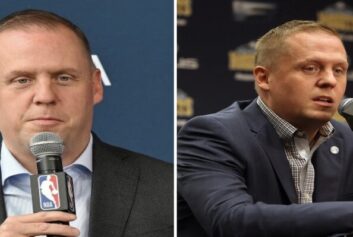With Kevin Garnett’s Hall of Fame induction, we’ve decided to re-publish this story in order to give props to KG The Kid, on an amazing career.
“We call him KG ‘The Kid’…
But if you have seen him with a basketball, you know that he been grown.
If you see him on the ball court, you know that he home.”- Styles P, And1 KG1 commercial.
In 1995, with the fifth pick of the NBA Draft, the Minnesota Timberwolves, finishing their sixth year in the league and unable to generate more than 29 wins in any season up to that point, decided to take a gamble on a skinny kid from Farragut Academy High School in Chicago.
36 years later Garnett changed the entire landscape of basketball and ended all doubt about the ability of certain elite high school players to go right into the league and be All-star effective.
KG shared some words after being inducted into the #20HoopsClass. 🙌 (via @NBA)pic.twitter.com/CQqEkn7MhQ
— House of Highlights (@HoHighlights) May 15, 2021
The Beginning
Affectionately referred to as “Da’ Kid”, Garnett appeared to be the ultimate manifestation of the term “born ready”, accumulating titles such as Mr. Basketball for the state of Illinois, winning Most Outstanding Player at the McDonald’s All-American Game and being named as the National High School Player of the Year by USA Today.
With a stat line that basically carried over to his future career in the NBA (25.2 points, 17.9 rebounds, 6.7 assists and 6.5 blocks while shooting 66.8% from the field) Garnett appeared to be a great player that needed to put on some muscle and spend some time on the collegiate hardwood before he could bang under the boards with the grown men in the NBA.
But KG and the Timberwolves had other plans in mind, and the team made him the first player to be drafted straight out of high school since Moses Malone in 1975.
NBA Draft
Looking at the list of players in that draft, one might think that the Timberwolves made a mistake by taking the high school baller.
Names like Joe Smith, Antonio McDyess, Jerry Stackhouse and Rasheed “Ball Don’t Lie” Wallace all went ahead of him, and other popular and recognizable collegiate names like Bryant “Big Country” Reeves, Damon Stoudamire, Kurt Thomas and Corliss Williamson all followed him.
To make the draft even more “head-scratching”, Michael Finley was taken with the 21st pick by the Phoenix Suns, behind names like Bobby Sura, Cherokee Parks and Ed O’Bannon (as Herm Edwards would say, “That’s why they play the game!”).
But again, the team and eventual new head coach Flip Saunders, had a plan, one that involved making the tall, wiry kid out of Chicago the cornerstone of their franchise. And for the next nine years, that plan worked pretty well.
While Garnett’s success as a player can’t be refuted – especially as he was a consistent double-double every night, going all out every time he stepped on to the floor – it’s his significance and impact as a player of culture that made him even more important to basketball fans, especially those who played on the blacktop courts in the inner cities of America.
Transcending The Game
He bridged the hood and the NBA and his impact only grew stronger as Garnett developed as a player. His hustle, drive, swagger, determination and never-back-down attitude reflected the voice of the streets and the outdoor courts, making him an instant fan favorite to those immersed in urban culture.
Yet he was marketable and business savvy, never alienating the corporate suits occupying the suites and front row seats in NBA arenas.
His cool demeanor even got him onto the silver screen, playing Wilt Chamberlain in the vastly underrated 1996 film “Rebound: The Legend of Earl The Goat Manigault” starring Don Cheadle.
Those are big shoes for a 17-year-old, unproven rookie to fill, but it seemed appropriate for him to play such a major figure in basketball history, as he would become an NBA legend himself.
He would even layout Manigault and talk smack to him, the latter of which he would be become infamous for during his career.
Ironically, the first player taken in that same 1995 NBA Draft, Joe Smith, also had an appearance in that movie, playing playground legend Connie Hawkins. Unfortunately, Smith wasn’t the real deal like Garnett turned out to be.
All-Time Great Duos: KG & Starbury
After a decent rookie year, Saunders instituted phase two of his rebuilding plan, executing a draft-day trade for Georgia Tech Yellow Jackets, and New York City High School Basketball legend, Stephon Marbury, giving the Timberwolves a double dose of young flavor on the court.
These guys walked the walk and talked the lingo, helping to set the stage for the NBA’s transition into hip-hop culture and hood-fabulous lifestyles.
That year Garnett increased his stats across the board, going to 17 points a game (up from 10.4), 8 boards (up from 6.3) and 3.1 assists (up from 1.8).
They made their first playoff appearance in franchise history, and although they were swept by a Houston Rockets team featuring Olajuwon, Drexler and Barkley, teams, fans, coaches and brands began to pay close attention to the Timberwolves. It’s a shame the team couldn’t keep KG and Steph together, as they were a lethal duo.
But we know it’s a business, and fame leads to fortune and that leads to drama for the young player from Chi-town. Biggie said it best- “The more money you make, the more problems you get. And jealousy and envy is something that comes with the territory.”
After signing a major extension with the team during the 1997-1998 season, a six-year deal worth $120 million, both Garnett and the Timberwolves were highly criticized for it, eventually having that contract become a part of the tension during the NBA lockout that shortened the following season.
But that didn’t stop KG, and he let his play reward the team for their loyalty, eventually producing an MVP season in 2004, averaging 24.2 points, 13.9 rebounds and five assists per game.
His awards and accolades would continue to increase. KG was the NBA All-Star Game MVP in 2003, the Defensive Player of the Year in 2008, a 15-time NBA All-Star and finally won his first NBA title with the Big Three in Boston in 2008 over Kobe and the Lakers.
Beyond The Stats
He would also win a gold medal as part of the US Men’s Basketball team during the 2000 Summer Games, and he’s the only player in NBA history to have at least 25,000 points, 10,000 rebounds, 5,000 assists, 1,500 steals and 1,500 blocks in a career.
Anyone can look up his stats and compare him to the greats of the past in the frontcourt, But beyond that, he was recognized, idolized and validated by the streets. Da’ Kid had that stamp of approval from day one. He could have easily joined the list of high school phenoms who never lived up to the hype, but instead, he was an example of why the option to skip college should still be available to certain rare gems.
You could hear it in his voice. You could see it in his style. The big diamond earrings in both ears with the scully tilted to the side while wearing a triple phat goose with a fur hood, yet with the verbal skills to shatter any negative stereotypes that would originate from a mere look at his physical presence. We knew it. We saw it. We recognized it. We appreciated it, and most importantly, we understood it when “others” could/would not.
The “IT” Factor
Although many attempt to “perpetrate the fraud” as my late Uncle would say, Garnett’s leadership, basketball intelligence and rugged emotional authenticity is something you can’t fake. You either have it or you don’t.
A.I. had it.
Ja Morant has it.
But KG came before them. He had the moxy that brands like And1 craved, and the personality and demeanor that brands like Gatorade and Adidas desperately wanted to tap into when they realized that they had to build a connection to the rapidly developing influence of urban culture.
He has the style that made Beats come calling when they needed an athlete to don their headphones in a commercial, appropriately using Aloe Blacc’s “The Man.”
Can you picture anyone else being able to pull off a scene similar to the one between Bill Buke and Tyrin Turner in “Menace II Society”? I just keep waiting for him to say “Now you know you done f*ed up right?”
Only thing is that Kevin Garnett hasn’t f*ed up yet.
You won’t find many with more heart, desire or Hall of Fame-worthy credentials. You don’t hear of him doing anything negative or illegal off the court.
With the way some of these modern-day black athletes have been handling themselves outside of the competitive arena, it’s truly refreshing to see someone who’s done it for so long without having to come clean, apologize or fall into a negative statistical category.
“You know my rap sheet! You know how I get down! 20, 10 and 5. How many times I gotta’ say this dog? I holds my own!”
Yes, you do KG, and now we know that you are forever enshrined among the great player in NBA history. You are a pioneer and a champion with a career that couldn’t be any more perfect.
“Anything is possible!” exclaimed The Franchise when he won his NBA title.
What else would you expect from a kid who followed Moses and played Wilt?



